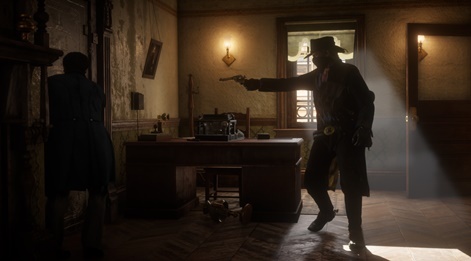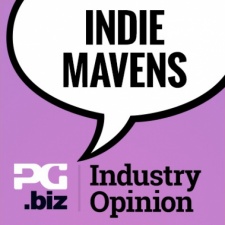Crunch has yet again become a key topic of debate in the games industry in the wake of Rockstar boss Dan Houser's comments about 100-hour work weeks and reports of poor working conditions at Telltale.
We already spoke to our Mobile Mavens about the matter. This time we asked our Indie Mavens about crunch in the indie scene and what exactly the appropriate levels of work might be.
Specifically, we asked:
- What are your thoughts on crunch when it comes to indie games development and how commonplace is it?
- What best practices do you use to maintain a work/life balance?
What are your thoughts on crunch when it comes to indie games development and how commonplace is it?
It may seem weird but I've experienced very very few crunch periods since I've been working in the video games industry. I know that's not very common. When I was at Eugen Systems, we had strict working hours and we never had any crunch at all.
Since owning Zero Games, we may have had a few rough days with a bit more hours than usual, but nothing close to real crunch periods.
Obviously, crunch is something we should ban from our industry as having people working on projects while being tired, depressed or uncomfortable at work will only lead to problems and unhappy people.
When I feel someone is exhausted, I always try to convince him/her to take a rest or some holiday.
What best practices do you use to maintain a work/life balance?
I don't think it's so hard to maintain a nice work/life balance. Take some holidays regularly, try to have flexible work hours if possible, keep a moment for sport or activities after or before work.
The worst thing is that I may be the only one (and also my business partner) at my own company that does not follow this advice!
Work is just work. That shouldn't be our only thing in life. Working too much has a bad influence on our private lives, which means it will have bad influence at work.
The real goal is to prevent falling into the infinite spiral of feeling like you don't get enough done - so measure what you do.Tanya X. Short
Burning yourself out as an indie is terribly common, whether through inexperience/inattention or through giving into bad habits under the stress and pressure.
The worst, most pernicious problem is that even though science shows we get less done after six weeks of overwork, it feels so much more productive. It's impossible to resist for many.
I completely empathise with those who find discipline difficult in these moments. It's hard to accept that more can't be done in less time.
For me, the answer is that project management is a skill that can be studied and learned. Tasks, milestones, and sprints are boring and tedious but help us know how quickly we actually work, and as a tool, help us better-predict results.
The real goal is to prevent falling into the infinite spiral of feeling like you don't get enough done - so measure what you do.
What are your thoughts on crunch when it comes to indie games development and how commonplace is it?
Unfortunately I’m very guilty of letting myself get into the bad habit crunch as an indie.I’m just in the process of decompressing after three months of it on two projects that suddenly became a priority while I was supposed to be getting ready to move house and office.
So I topped off the crunch with a manic two-week packing stint and then four days of driving across Europe, because stress is good for you apparently*).

The upside was we managed to get two great games out (AiRburst and Flick Fishing), but it’s not something I’d want to push employees to do. It’s only vaguely okay to do crunch when you own the company.
When we started Strange Flavour, we made it a thing that we weren’t going to do crunch unless we *really* wanted to (i.e. we were both really having fun working on the project) and we’d be mindful of our physical and mental health.
Fire drills will happen, but if the rest of the project is well planned, you’ll have rested enough to be able to cope with them.Aaron Fothergill
That’s something we’ve mostly managed over the last 15 years, but have definitely slipped from time to time. Sometimes it was worth it, others definitely not so.
It’s very common with indies because there’s a definite element of doing it for the love of it (although we do want to make enough money off it to keep doing it). So enthusiasm can get the better of you.
It doesn’t help that wearing the game designer, coder, network guy, marketing, tea boy, cat trainer, etcetera hats all at once means the project manager side of things can be a bit unfocused if you’re not careful.
We’ve both experienced crunch at the triple-A developer level when we worked at Argonaut Games. I think we ended up doing at least some crunch on all the games we worked on there.
Some were reasonable levels (and games where most of us were enjoying working on them, so it wasn’t too bad to trade having a life for a bonus), others were hell on earth nightmares where we didn’t get a holiday or a full weekend for 18 months and personal health and welfare took a bad hit.
What best practices do you use to maintain a work/life balance?
Mostly trying to wear the project manager hat as often as possible and actually plan how much time it will need. Fire drills will happen, but if the rest of the project is well planned, you’ll have rested enough to be able to cope with them.
*Oh, I re-read that article. Apparently, stress *isn’t* good for you.
What are your thoughts on crunch when it comes to indie games development and how commonplace is it?
There is a special allure I think a lot of indies have in the back of their minds. It feels like a self-made lottery ticket is possible. If only we work a little harder, get this one last feature in. And so it keeps driving you, on and on thinking maybe this thing, this time it will "hit".
There's always the next exciting game on the horizon, a new marketing idea, some new contract work I've got to get; but you've got to stay healthy, both in mind and body.Nathan Fouts
A lot of us "working indies" have to just keep going and can never coast for years on a big fortune. The work is great, but it can, of course, wear you down if you're not careful.
What best practices do you use to maintain a work/life balance?
I worked on Pig Eat Ball for over five years, doing it full-time, but also taking contract work to stay afloat. We finally shipped it last month to Steam and it's great to see the reviews. But now it's on the console ports. And probably mobile after that, if we're lucky.
You keep making new milestones, seeing new goals. I like to think of a half-quote from Men in Black. When Jay is really worked up about the next big thing, Kay calms him down "There's always an Arquillian Battle Cruiser, or a Corillian Death Ray, or an intergalactic plague..." to me says "work never ends".
To cope, you've got to have a routine to make it through. I work from a home office, so a routine of workouts, yoga, healthy eating and lots of family time is important.
Because there's always the next exciting game on the horizon, a new marketing idea, some new contract work I've got to get; but you've got to stay healthy, both in mind and body.
Pocket Gamer Connects London (January 21st to 22nd 2019) will host a 'Culture Club' track that will delve into a variety of subjects, including that of crunch and best working practices.

























